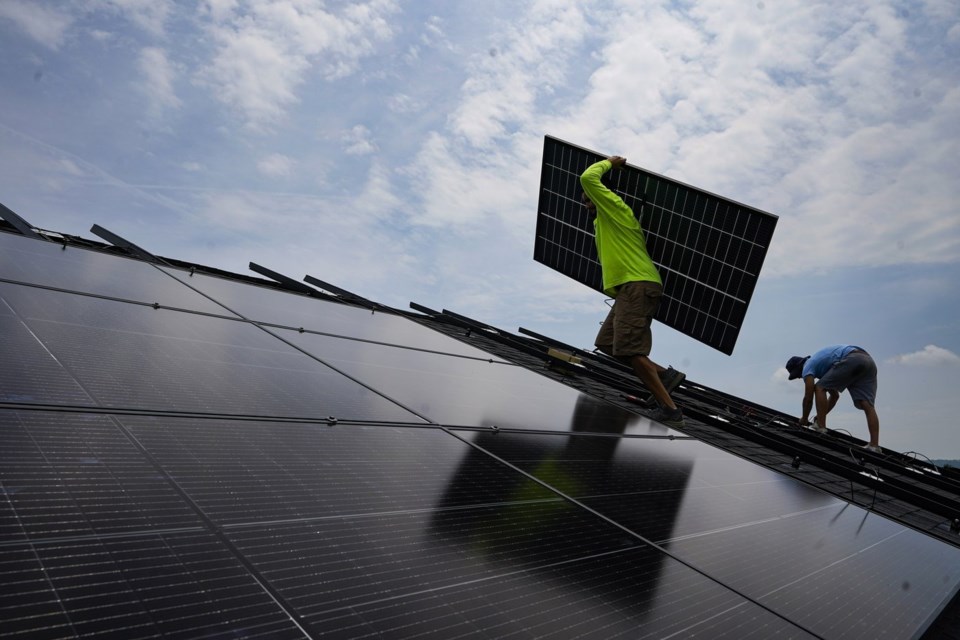Tax credits for clean energy and home energy efficiency would still be phased out, albeit less quickly, under Senate Republicans' latest proposed changes to a massive tax bill. Electric vehicle incentives and other provisions intended to move the United States away from fossil fuels would be gutted rapidly.
Senate Republicans cast their version of the bill as less damaging to the clean energy industry than the version House Republicans passed last month, but Democrats and advocates criticized it, saying it would still have significant consequences for wind, solar and other projects.
“They want everybody to believe that after the flawed House bill, that they have come up with a much more moderate climate approach," said Sen. Ron Wyden of Oregon, the top Democrat on the finance committee, during a conference call with reporters Tuesday.
“The reality is, if the early projections on the clean energy cuts are accurate, the Senate Republican bill does almost 90%" as much damage as the House proposal, added Wyden, who authored clean energy tax credits included in the passed during former President Joe Biden’s term. “Let’s not get too serious about this new Senate bill being a kinder, gentler approach.”
Whether all of the changes will be enacted into law isn't clear yet. The Senate can still modify its proposals before they go to a vote. Any conflicts in the draft legislation will have to be sorted out with the House as the GOP looks to fast-track the bill for a vote by President Donald Trump’s imminent Fourth of July target.
Notably, many Republicans in Congress have advocated to protect the clean-energy credits, which have overwhelmingly benefited Republican congressional districts. A report by the research firm found that 77% of planned spending on credit-eligible projects are in GOP-held House districts.
The clean energy tax credits stem from Biden’s climate law, which aimed to boost to the nation’s transition away from planet-warming greenhouse gas emissions and toward renewable energy such as wind and solar power.
The House version of the bill and effectively made it impossible for wind and solar providers to meet the requirements and timelines necessary to qualify for the incentives. After the House vote, 13 House Republicans lobbied the Senate to preserve some of the clean energy incentives that GOP lawmakers had voted to erase.
Renewables and reaction
Language included Monday in the would still phase out — though more slowly than House lawmakers envisioned — some Biden-era .
The Senate proposal further “achieves significant savings by slashing Green New Deal spending and targeting waste, fraud and abuse in spending programs while preserving and protecting them for the most vulnerable,” said Sen. Mike Crapo, R-Idaho and chairman of the committee.
On the chopping block are tax credits for residential rooftop solar installations, ending within 180 days of passage, and a subsidy for hydrogen production. Federal credits for wind and solar would have a longer phaseout than in the House version, but it would still be difficult for developers to meet the rules for beginning construction in order to receive the credit.
At the same time, it would boost support for geothermal, nuclear and hydropower projects that begin construction by 2033.
“The bill will strip the ability of millions of American families to choose the energy savings, energy resilience, and energy freedom that solar and storage provide,” said Abigail Ross Hopper, president and CEO of the Solar Energy Industries Association. “If this bill passes as is, we cannot ensure an affordable, reliable and secure energy system.”
Opponents of the Senate’s text also decry domestic manufacturing job and economic losses as a result.
“This is a 20-pound sledgehammer swung at clean energy. It would mean higher energy prices, lost manufacturing jobs, shuttered factories, and a worsening climate crisis,” said Jackie Wong, senior vice president for climate and energy at the Natural Resources Defense Council. “Senators should take a hard look at the businesses creating jobs in their states and the reality of spiking electricity bills.”
Home energy efficiency credits and EVs
The bill would also cancel incentives such as the Energy Efficient Home Improvement credit — which helps homeowners make improvements such as insulation or heating and cooling systems that reduce their energy usage and energy bills — 180 days after enactment. An incentive for builders constructing new energy-efficient homes and apartments would end 12 months after signed. The House’s proposed end date for both is December 31.
“Canceling these credits would increase monthly bills for American families and businesses,” Steven Nadel, executive director of the nonprofit American Council for an Energy-Efficient Economy said in a statement. “Why would we stop helping families save energy when prices are going up and up?
The Senate proposal moves up the timeline for ending the consumer electric vehicle tax credit from the end of this year to 180 days after passage. It also cuts the provision that would have extended until the end of 2026 a credit for automakers that had not made 200,000 qualifying EVs for U.S. sale. It would also immediately eliminate the $7,500 credit for leased EVs.
This administration has staunchly gone after EVs amid Trump's targeting of what he calls a “mandate,” incorrectly referring to a Biden-era target for half of new vehicle sales by 2030 be electric.
___
Associated Press writers Matthew Daly in Washington and Jennifer McDermott in Providence, R.I., contributed to this story.
___
The Associated Press’ climate and environmental coverage receives financial support from multiple private foundations. AP is solely responsible for all content. Find AP’s for working with philanthropies, a list of supporters and funded coverage areas at .
Alexa St. John, The Associated Press



